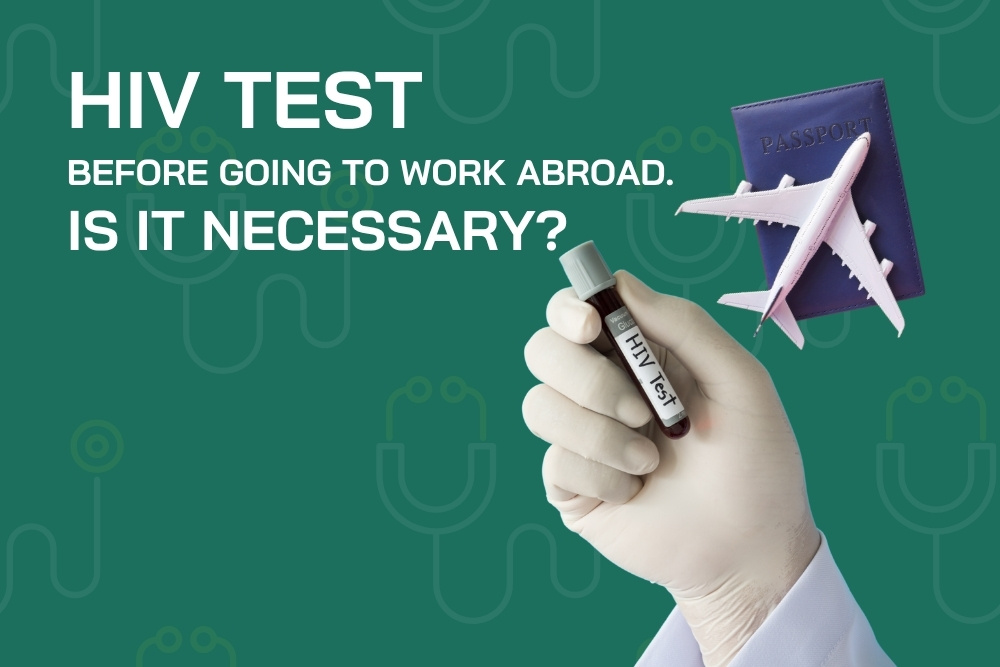Many people may wonder if an HIV test is required when undergoing a health checkup before traveling for work abroad. The answer is yes, this is a requirement for anyone traveling abroad, almost everywhere in the world, especially for those who are going to work in another country directly. Regardless of the country you are traveling to, undergoing a medical checkup before departure is essential. This is necessary to meet the requirements set by the Thai Labor Administration for overseas workers and to confirm that you are in overall good health, free from any prohibited diseases for certain countries or specific types of work. It also helps reduce the risk of diseases that could occur while you are working abroad.
List of Content
1. The importance of health checks before going to work abroad
2. Why do I need a health check before going to work abroad?

3. What checks do I need to do when working abroad?
- Vaccination is another option to help prevent diseases prohibited in each country.
- Documents required for health examination when traveling abroad
4. Cost of health check-up for working abroad
The importance of HIV test before going to work abroad
Going to work or study abroad is another goal for many people because the salary is satisfactory and the employment rate is high. Therefore, the most important thing when traveling abroad is health. When you go to a foreign country, traveling and living in that country may be more difficult. The most important thing is to study first whether the country you are interested in traveling to has any prohibited diseases or not. In order to have a preliminary health check that matches the disease in the risk group of that country Because traveling to a foreign country or a distant place may have the opportunity to face unexpected health problems.
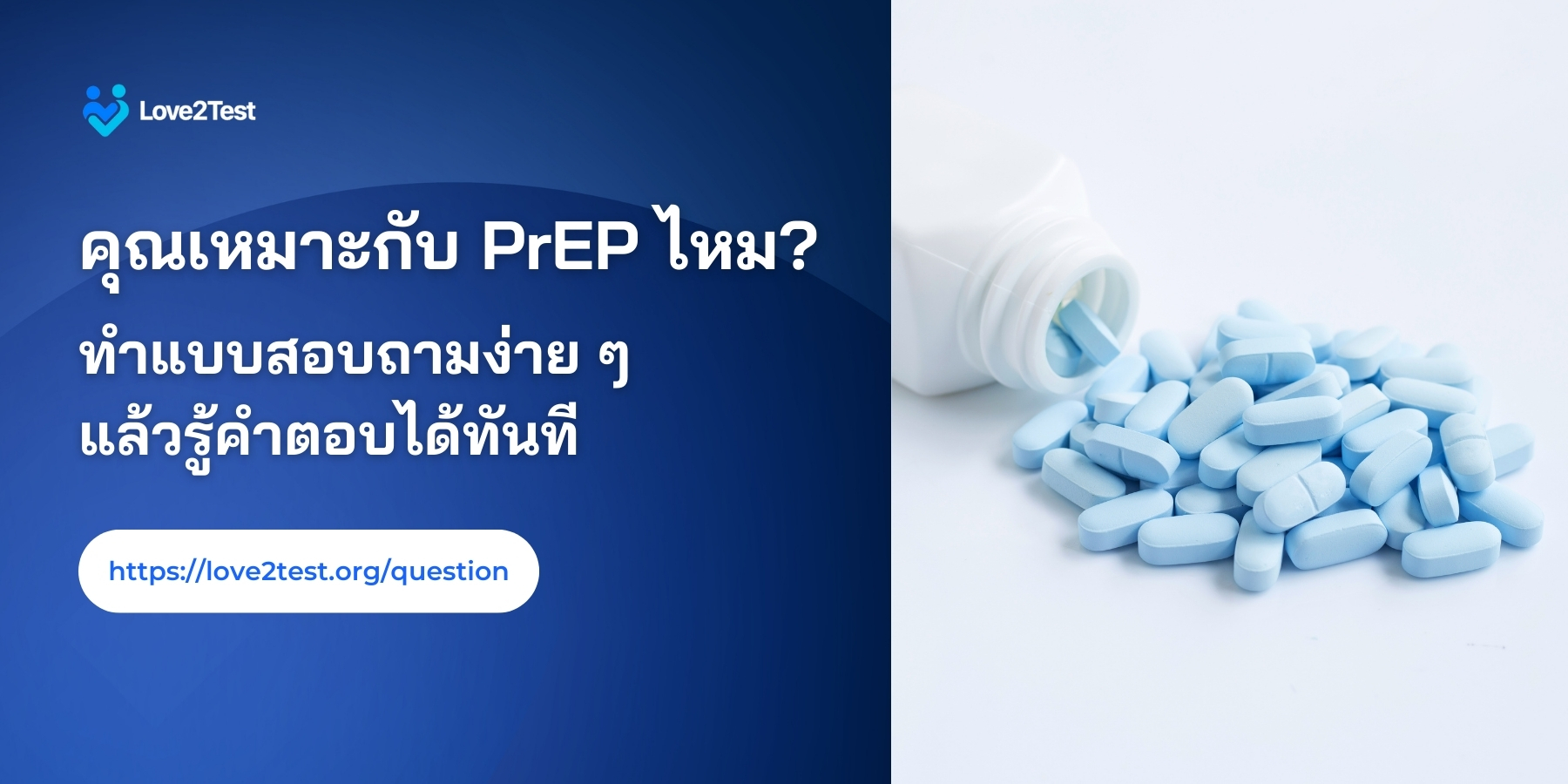
There are many ways to go to work abroad, whether it is contacting a recruitment agency to send you or contacting the Department of Employment, or even you can contact to find a job yourself, etc.
Why do I need a health check before going to work abroad?
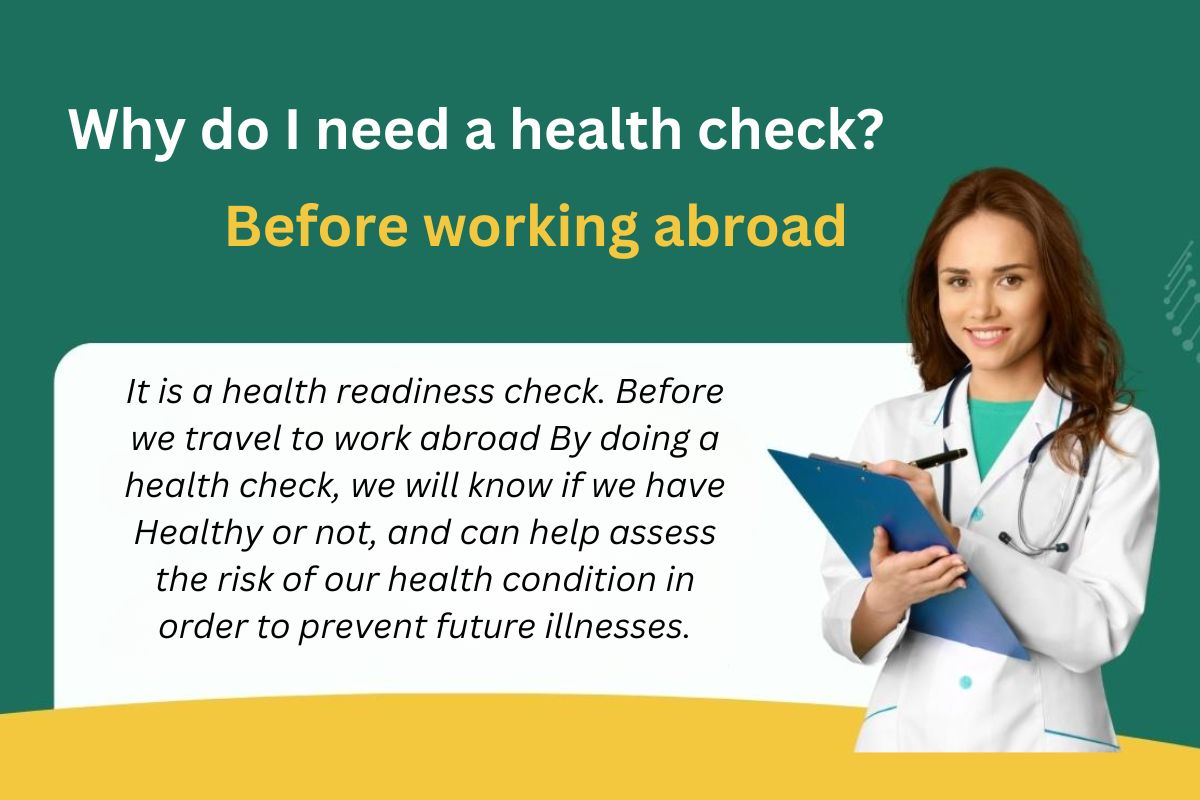
For some countries, having a chronic disease will be an obstacle to work, especially if the work is quite physical. Having a chronic disease may cause the symptoms to worsen when living there. Therefore, if it is found that a person has a chronic disease, it may affect going to work. For the prohibited diseases for health checks abroad, most of them include tuberculosis, lung disease, hepatitis B, syphilis, and AIDS, or may be other prohibited diseases, which may vary according to the conditions of each country. If you do not have any of the prohibited diseases specified, you have the right to enter to work in that country.
What checks do I need to do when working abroad?
The procedure for the health checkup is similar to a general medical examination, which includes weighing, measuring blood pressure, height, and vision, as well as blood tests, urine tests, stool tests, chest X-rays, and screening for various diseases by a specialist. The most common diseases that are emphasized for screening before traveling for work abroad are infectious diseases that may spread, such as leprosy, elephantiasis, parasites, lung diseases, active tuberculosis, syphilis, and HIV.
Vaccination is another option to help prevent diseases prohibited in each country.
Vaccination for individuals traveling abroad for work is another method to help prevent the onset of diseases. For example, in Taiwan, it is necessary to receive vaccinations for measles, rubella, and mumps (MMR), along with deworming medication. Additionally, there are many other vaccines that may be required depending on the destination country, activities, the nature of the work, and the length of stay. These vaccines are divided into two categories:
- Required Vaccines: These are mandatory based on international health regulations (WHO IHR). Currently, the only required vaccine is the yellow fever vaccine, which must be administered at least 10 days before travel for those going to countries in Africa and South America.
- Recommended Vaccines for Travelers: These vaccines are advised depending on various factors, such as the risk of infection in the destination country, the duration of the stay, the activities or type of work being done, and considerations specific to the traveler and the diseases in question. A physician will evaluate all these factors before recommending any additional vaccines.
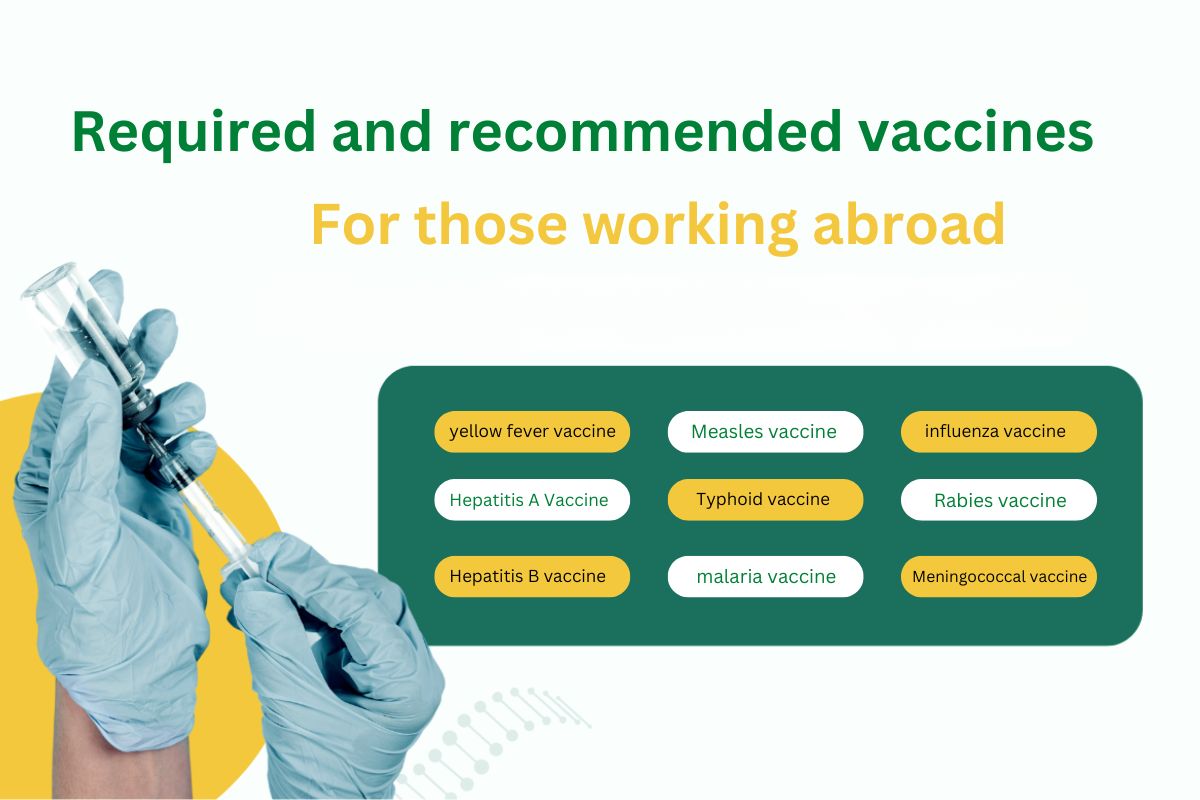
Documents required for health examination when traveling abroad
- A copy of your national ID card – 1 copy
- A copy of your passport – 1 copy
- Passport-sized photo (1.5 inch or 2 inch) – 2 photos (If you need more than one medical certificate, please prepare an additional photo for each certificate)
- Write the following information clearly on the copy of your ID card:
- The country you will be working in
- Your contact phone number
- The name of the company that will employ you
Cost of health check-up for working abroad
The health check-up program for working abroad will cost from 500-1,500 baht, depending on the details of the health check-up program in each country. For example:
| country | Inspection details list | Price (baht) |
|---|---|---|
| Europe |
|
850 |
| USA |
|
560 |
| Korea |
|
1500 |
List of prohibited diseases for work in each country
You should first study whether the country you are interested in traveling to has any prohibited diseases, so that you can have a basic health check that matches the diseases that are in the risk group of that country.
Taiwan
- Sexually transmitted diseases (syphilis) including those who have been treated, TPHA positive
- Tuberculosis including cases of lung spots, abnormal lungs with scars due to having had it and have been cured
- Worms (except for intestinal worms, which are allowed to stay in Taiwan for treatment within 1 month)
- Leprosy
Hongkong
- Sexually transmitted diseases (except after receiving treatment)
- Tuberculosis
- Hepatitis B and C
- AIDS (HIV)
- Parasitic diseases
- Pregnancy
- Other diseases as specified in the employment contract
Saipan
- AIDS (HIV)
- Tuberculosis
- Other serious infectious diseases
Saudi Arabia, United Arab Emirates,Qatar,Oman,Kuwait and Bahrain
- HIV test (HIV)
- Hepatitis B and C
- MalariaLeprosy
- Tuberculosis, lung abscess
- Sexually transmitted diseases such as syphilis
- Chronic Kidney Disease
- Chronic Liver Disease
- Heart Disease
- Stress
- Uncontrolled Diabetes
- Cancer
- Psychosis, Insanity
- Other Disabilities such as Color Blindness (for Driver Position) Deafness, etc.
- Pregnancy (All female workers who will enter the workforce must undergo a physical examination)
Libya
- Syphilis Tested by VDRL
- HIV Test (HIV)
- Stool RIB Test
- Urine Test
- Tuberculosis
- All types of Hepatitis Virus
Singapore
- Sexually transmitted diseases (except those that have been treated)
- Pulmonary tuberculosisHepatitis B and C
- AIDS (HIV)
Greece
- AIDS (HIV)
- Cholera
- Malaria
Israel
- Tuberculosis
- Hepatitis B and C
- Syphilis
- Sexually transmitted diseases
- HIV test (HIV)
- Color blindness
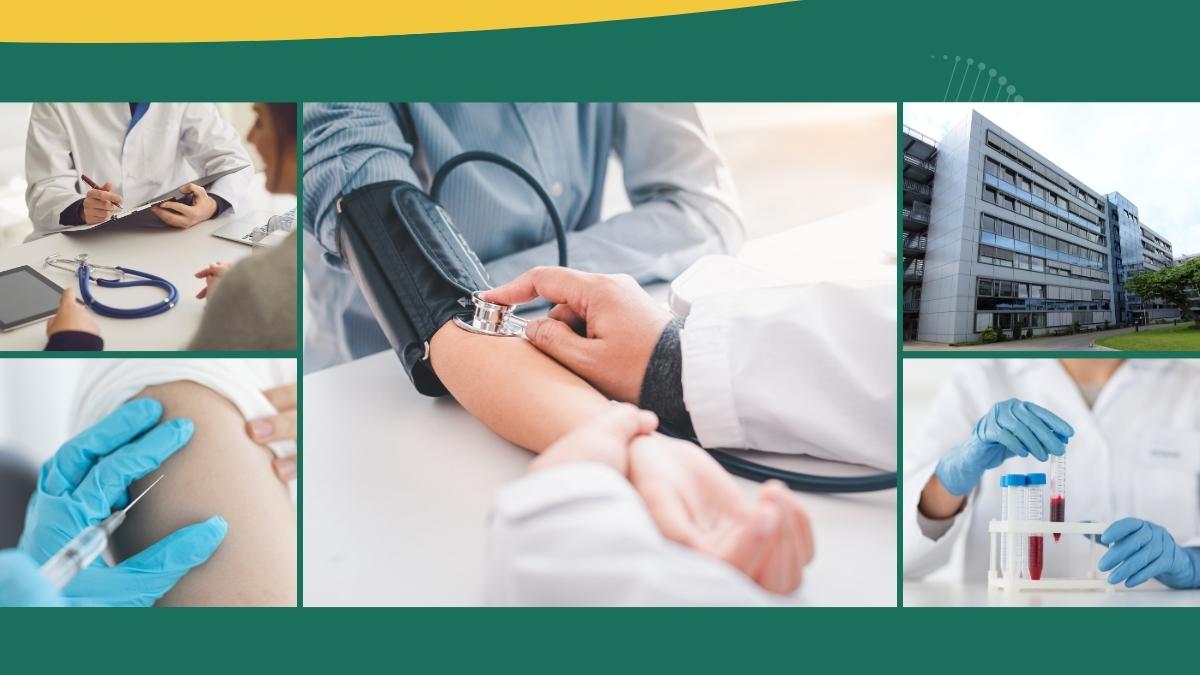
Japan
- Epidemics and Infectious Diseases
- Ebola hemorrhagic fever
- Crimean-Congo haemorrhagic fever (CCHF)
- Dengue Fever
- Plague
- Marburg virus disease
- Lassa virus
- Cholera
- Sars
- Smallpox
- Malaria
- Yellow fever
- Mental health problems
Korea
- Hepatitis B and C
- AIDS (HIV)
- Sexually transmitted diseases such as syphilis
- Tuberculosis
- Scoliosis, amputated fingers and toes, bowed limbs
- All types of heart disease
- Treponema pertenue
- Diabetes
- High blood pressure
- Kidney disease
- Liver disease
- Psychiatric IIness
- Color blindness, shortsightedness (must not exceed 400)
- Hearing loss
- Blood disease
Malaysia
-
- AIDS (HIV)
- Tuberculosis
- Leprosy
- Venetian diseases
- Epilepsy
- Psychiatric IIness
- Hepatitis B and C
- HIV test results found HIV Antibody (Elisa), HbsAg or VDRL/TPHA
- Drug addiction (Opiates/Cannabis)
- Pregnancy (must have physical examination of all female workers who will enter the work)
Brunei
- Tuberculosis
- Sexually transmitted diseases
- AIDS (HIV)
- Epilepsy
- Psychiatric IIness
- Hepatitis B and C
- Drug overdose for suicide (History of drug abuse)
- High blood pressure
- Diabetes
- Asthma
- Cancer
- Heart disease
Russia
- HIV test
- Tuberculosis
- Leprosy
- Syphilis
Health check-up locations before going to work abroad
- Chulalongkorn Hospital, Thai Red Cross Society, is one of the four medical facilities in Bangkok that has been approved to conduct health checks and issue medical certificates for all countries worldwide. The hospital provides comprehensive services for those traveling abroad, regardless of the destination. A dedicated health checkup clinic has been established to ensure convenience and efficiency for its patients. The clinic is located at 1873 Rama IV Road, Pathumwan, Pathumwan District, Bangkok 10330. For inquiries, call 02-256-4000.
- The Health Checkup Center for Overseas Travel, Faculty of Medicine, Ramathibodi Hospital, Mahidol University, also provides health checkup services for those traveling abroad.
- The Rewadee Medical Service Center is located at 108 Sam Sen Nai, Phayathai District, Bangkok 10400. For inquiries, call 091-774-6463, 064-585-0941, or 064-585-0940.
- The Overseas Work Health Checkup Center is located on the 2nd floor of Building 4 at Paolo Hospital Chokchai 4. For inquiries, call 02-514-4141, extension 2312 or 2315.
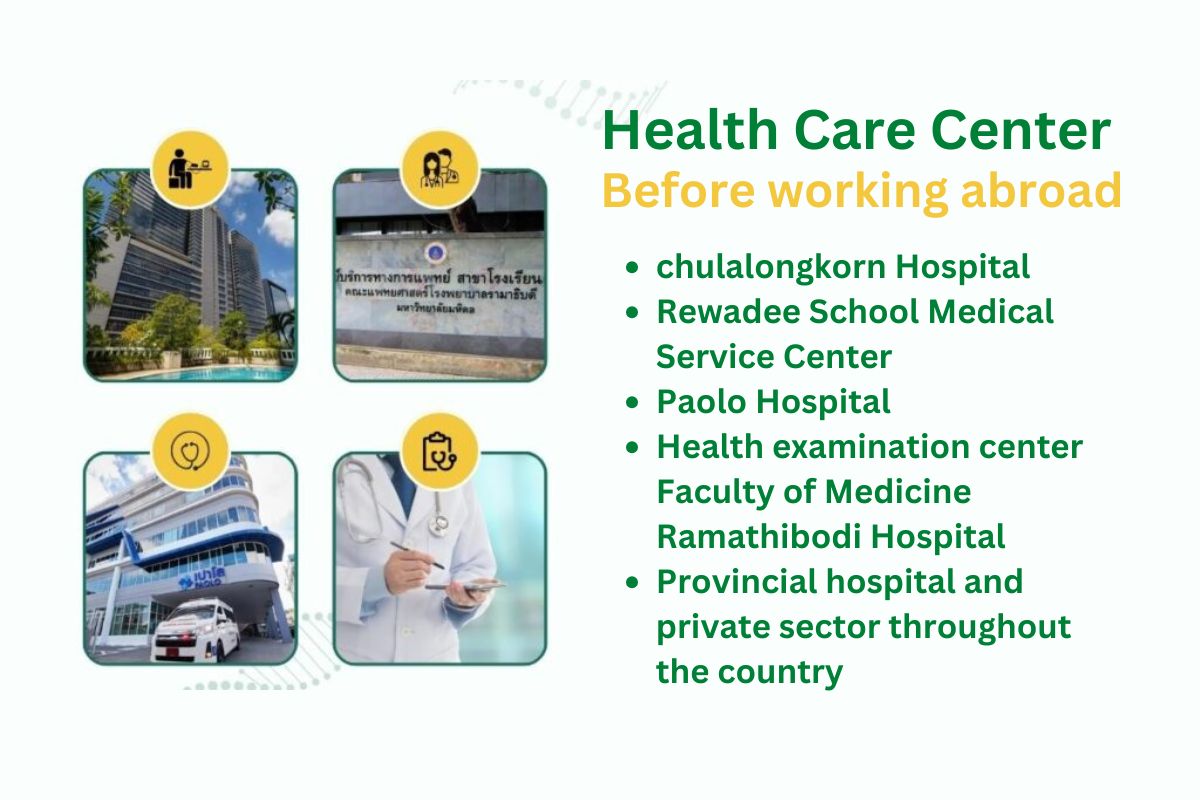
In summary, occupational diseases in each country vary depending on the type of work and the risks to the health and safety of the worker. Generally, occupational diseases are usually contagious or chronic diseases that may affect work efficiency or cause harm to others.
In addition, some countries have laws that require employees to have a health check before starting work, which may include testing for the aforementioned prohibited diseases. Generally, pre-employment health checks are conducted by doctors or nurses who will consider selecting the appropriate examination for the type of work and the risks that may occur to the worker.
